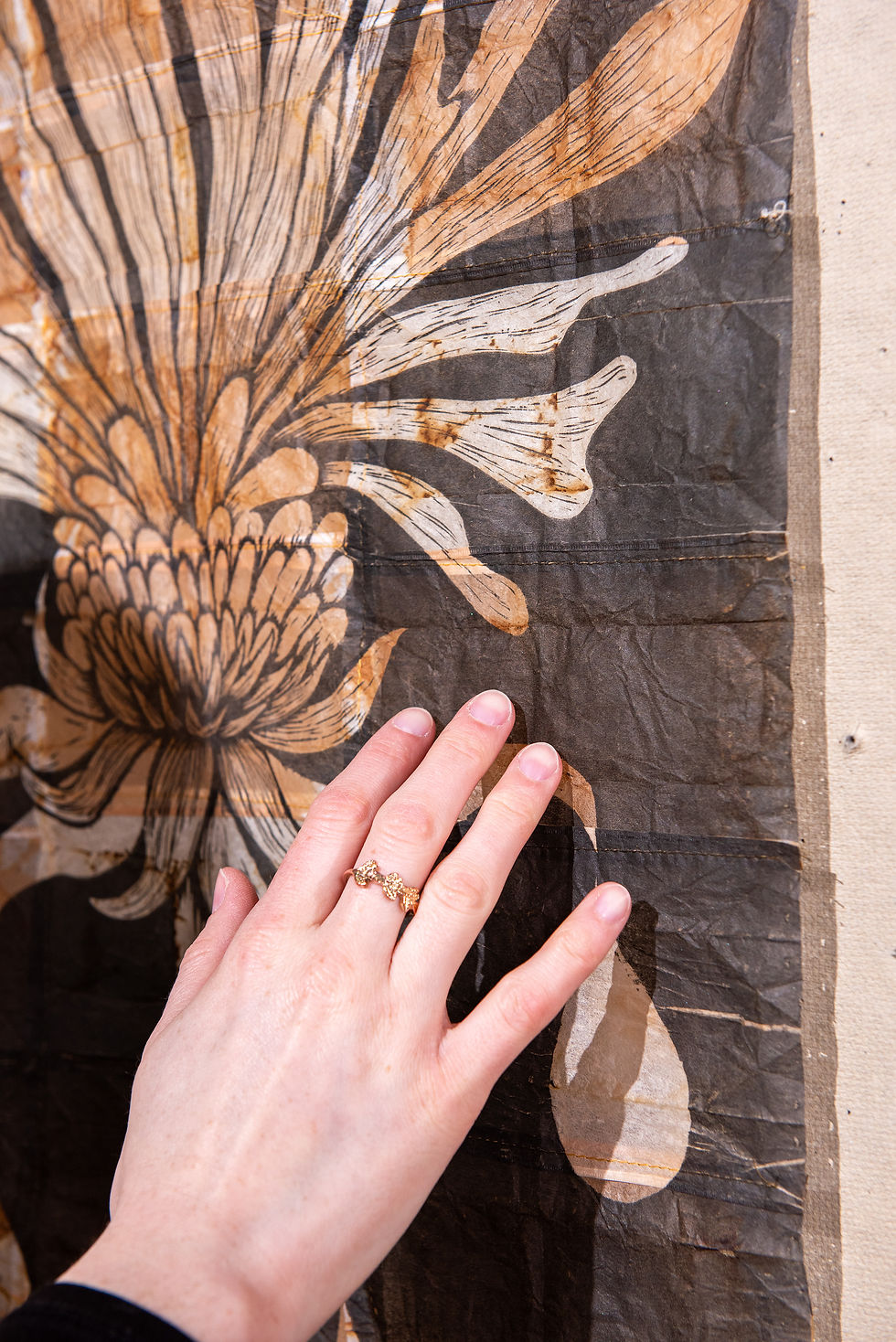Delaney Burns, EMERGE Artist in Residence in Print 2024-25 Session II
- May 6, 2025
- 3 min read
Interview with Katie Bonadies, May 2025

Delaney Burns (she/ her) is the 2024-25 Session II RWS EMERGE Artist in Residence in Print. Her printmaking includes mostly woodcut and lithography, and she recently got back into etching. She does some photography as well.
Delaney currently teaches printmaking at UMaine where she received a BFA in Studio Art and Marketing. As soon as she stepped into the print studio for her first college class she knew it was where she was meant to be, “I’ve been printmaking ever since and I can’t imagine doing anything else.” She took all of the printmaking classes she could and went straight to graduate school where she earned a degree in Print Media and Photography from Boston University. Delaney graduated a year ago and has been trying to figure out what career will best balance with her artistic practice. She’s happy to explore multiple routes and has been carving out time to come to the studios, “I think that’s what we have to do as artists, we have to make it work and do what’s necessary.”

In graduate school Delaney constantly analyzed her artwork and realized everything connects back to her family. She likes seeing those connections and how it informs her work. She recently took film images of her mother gardening. Gardening is a lot of work that takes a great deal of tenderness and care. Delaney took the pictures, developed the film, exposed the film, scanned it to her computer, and printed out to use for acetone transfers. Delaney is a process person and what she loves about printmaking is that each stage of the process is different, "You're prepping your block, carving, and printing your block." She likes the physical intensity of printmaking as well, like graining on the stone, and has been equating artistic labor to the domestic labor she explores thematically. The series she has been continuing while in residence is inspired by the plants found in her mother's garden; plants traditionally used to reproductive health.
The project examines her family history on Chebeague Island and how the women of her family have handed down generational knowledge. She’s exploring how these themes tie into gender roles and celebrating the physical and mental labor the women of her family put into maintaining a household and family. She’s interested in the unintentional ways these roles are inherited by example and direct communication, and how it becomes implicit, internalized knowledge we aren’t always aware of. She’s also looking into the ways information about relationships and ways of handling things was intended to protect women. “I’m looking at reproductive health and how my mom taught me about periods and sex, and how that information was handed down to her.” She’s comparing experiences and how these gender roles and societal expectations inform us.


She does this by beginning with a flower that was traditionally used for reproductive health and transforming it symbolically. Delaney will take a flower and translate it into something else that carries the message she wants to express. She started with poppies, which are a symbol of grief. She has recreated them in a way that looks like they are expressing emotion, either by dropping seeds or bleeding.
Delaney is using her grandmother’s diary as a source of inspiration, which documents her daily life. “They’re really interesting because they are very impersonal; she doesn’t express emotion through them. That’s very different from how we view diaries as keeping deepest secrets and emotions.” Delaney has been tracing her grandmother’s script on drypoint and layering these diary pages with her own texts. Delaney tries to keep her own original texts more illegible by writing in cursive. It’s a stream of consciousness, which has been an exercise that allows her to not hold back. She’s thinking about words and letters as forms, and, for Delaney, it’s about the feeling that is evoked by seeing these texts rather than the meaning of the words. She's exploring what they can say on their own.

Her familial research feels just as important in the process of this transitional phase of self-discovery. Delaney is excited to be a part of the EMERGE program. It's the first time she's been in a creative space since graduate school. She's working more freely and is allowing herself to make whatever comes to mind, allowing the work to lead her to new discoveries. "The residency has really given me the space to just be an artist again."
Contact Delaney Burns through her website, delaneyburns.com, or through email, delaney.c.burns@gmail.com. Follow her on Instagram, @d_burns_art.




Comments